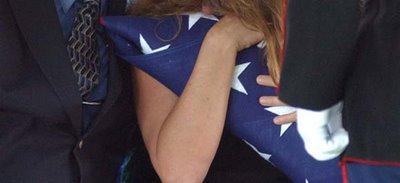By Chris Floyd
t r u t h o u t Report
Friday 25 August 2006
They say that America's increasingly right-wing courts are bent on halting the forward march of civil rights, but that's a typical liberal canard. Why, just last week, a federal judge - appointed by Ronald Reagan, no less - issued a bold ruling that offers shield and succor to a small, despised minority on the fringes of American society.
War profiteers.
In a little-noticed decision unsealed on August 18, US District Court Judge T.S. Ellis III overturned a $10 million fraud verdict against Custer Battles LLC, one of the many crony conquistadors who gorged on the vast porkfest known as "Iraqi reconstruction" during the high and palmy days of the Coalition Provisional Authority. Ellis's judgment effectively provides blanket immunity for the many politically-wired gorgers who made off with almost $9 billion in "unaccounted-for" taxpayer money during the CPA's misrule of Iraq from April 2003 to June 2004 - one of the greatest heists in world history.
Why will the mammoth fraudsters go free? Because of the iron illogic behind the decision. Although the CPA was created, funded, staffed and directly controlled by the US government, Ellis declared it was not, in fact, an entity of the US government. Therefore, Custer Battles - and by extension any other accused grafter from the CPA's golden age - cannot be sued under the federal False Claims Act for defrauding the US government. For even if massive fraud was committed - and Ellis, who also presided over Custer Battles's jury trial in May, clearly indicated that it was - the "victim" no longer exists: the CPA has dissolved into air, into thin air, like the "baseless fabric" of Prospero's vision in The Tempest. So, case dismissed - and the blood money stays safely in corporate coffers.
Ellis wove his ruling from another baseless fabric: UN Security Council Resolution 1483. The May 2003 resolution was the world body's desperate attempt to put some sort of ex post facto quasi-legal face on the Bush-Blair coalition's unprovoked act of aggression in Iraq. But in the end it was just another sham. The CPA remained an all-American show, run by George W. Bush's personally appointed satrap, Jerry Bremer, who wielded autocratic sway over the conquered land. The Authority's power and money - including Iraq's oil profits - were solely in the hands of the White House and Pentagon. But although the reality of Washington's "command and control" of the CPA was undeniable, Judge Ellis obviously followed the credo laid down by the high Bush official who told Ron Suskind in 2004: "We're an empire now, and when we act, we create our own reality." They certainly do.
As the New York Times notes, the Custer Battles case was meant to be the first of many Iraqi fraud trials based on the False Claims Act, a law allowing allows "whistleblowers" in companies defrauding the government to take their firms to court and share a percentage of the award with the feds. Now these upcoming cases - including a second trial against Custer Battles - are almost certainly dead in the water. The courageous efforts of insiders who lost their jobs - and in some cases risked their lives - to uncover the truth about the Bush gang's epic plundering in Iraq will all be for naught.
That's quite a legacy for a small company few have ever heard of. After all, next to prize war-porkers like Halliburton, Bechtel and General Dynamics, Custer Battles is just a tiny sausage sizzling in the huge vat of government grease. But the firm's case is a paradigm of the entire misbegotten enterprise in Iraq: raw greed masquerading as a noble cause in a deliberately concocted atmosphere of lawlessness, violence, subterfuge - and the convenient unaccountability fomented by the bloody chaos of war.
Custer Battles is not, as you might think, named for that earlier undermanned, overconfident, foolishly conceived military incursion which ended in disaster - the one at Little Big Horn. Instead, the ill-omened appellation comes from the company's founders: ex-Army Ranger and Special Operations vet Scott Custer and his partner, fellow Ranger Mike Battles, who also brought his experience as a clandestine CIA officer, FOX News commentator and failed Republican Congressional candidate to the mix.
The pair set up shop a few months after 9/11 to cash in on the burgeoning market in fear and war, operating under the admirably frank company motto: "Transforming risk into opportunity." But it was all nickel-and-dime stuff at first, until Bush tore open the mother lode of military largess with the invasion of Iraq. Suddenly, Mike and Scott's shoestring operation found itself with a $16 million contract to take charge of security for the strategically vital Baghdad airport. This was followed by $24.4 million to help distribute Iraq's new American-made currency, along with sundry other hired-gun work - such as housing military dogs and low-wage Filipino workers brought in to serve Iraq's new masters.
How did this happen? As with so much else in Bush's Babylonian conquest, the company's metamorphosis from shoestring to Gucci boot is shrouded in murk. According to a gushing 2004 profile in the Wall Street Journal, it was all down to "street smarts," luck and pluck. We're told that ex-CIA man Battles arrived in Baghdad in May 2003 "armed with little more than moxie," $450 in borrowed cash (the company was broke), and a vague notion of scoring some deals. Three weeks later, unnamed Bush officials handed him a duffel bag stuffed with $2 million in cash - a friendly "loan" to get the ball rolling - and put the airport into the hands of the destitute, unknown, inexperienced company. A fairy-tale ending, one might say.
By the summer of 2004, the company, now worth an estimated $100 million, was in high cotton. Custer was working the crony ropes: "Al Kampanen, the White House rep at the Pentagon, who works directly for Rumsfeld," was inviting him to drop by and talk about expanding the company's work into Liberia and Afghanistan, according to company emails unearthed during the fraud probe and reported by Wayne Madsen. "Doug Combs, now acting Under Secretary of the Navy, also called to see if he could 'help us grow' outside of Iraq," enthused Custer. Meanwhile, Battles was busy trying to complete the book he'd been touting on the company web site: Blood in the Streets: Seizing Opportunity in Crises. Life was sweet.
Then the Pentagon was forced to suspend Custer Battles from further contracts and launch an investigation after several former company executives - including ex-FBI man Robert Isakson - filed a "whistleblower" lawsuit against the firm, citing what the Pentagon admitted was "adequate evidence of ... fraud, antitrust violations, embezzlement, theft, forgery, bribery, false statements" and other offenses, as the Los Angeles Times reported.
The lawsuit accused Custer Battles of setting up off-shore front companies and sham sub-contractors to inflate billings in its lucrative "cost-plus" contracts, where the government covers all expenses and guarantees a set profit; the alleged rake-off was estimated in the tens of millions. Isakson said that when he had objected to these and other irregularities, two unnamed "top company officials" burst into his office with machine guns, held him and his 14-year-old son at gunpoint for hours, then stripped Isakson of his ID, money and gun and told them find their own way out of Iraq, the LAT reported. Father and son eventually made their way through the hellhole of Fallujah to safety in Jordan.
Isakson lived to tell the tale - and file the suit - but all to no avail, thanks to Judge Ellis. The only surprising thing about this sweet deal for unabashed war profiteers with a direct line to the White House is that the trial was actually allowed to run its course before the foreordained conclusion. Then again, there was no real need for the administration to sweat it - Ellis is a decidedly safe pair of hands for Bush's dictatorship of the executive.
In a ruling issued just days before the Custer Battles kibosh, Ellis dug up a long-abandoned World War I-era law to give Bush carte blanche to prosecute journalists for publishing leaks of classified information. (No "Pentagon Papers" emerging from the Iraq War, then.) In May, he threw out a civil suit against the CIA filed by Khalid al-Masri, a German citizen who had been seized in Macedonia for "driving while Arab," renditioned to Afghanistan, tortured for months, then dumped on a dirt road in Albania and, like Isakson, told to find his own way home. Ellis agreed with administration lawyers that such a trial would "endanger national security" - establishing a convenient "state-secrets" precedent for quashing any further attempts to rectify the depredations of Bush's Terror War.
The worthy judge, a respected scion of the Establishment - Navy man, community pillar, degreed by Princeton, Harvard and Oxford - is just one of Bush's willing enablers among the great and good, offering a patina of legitimacy to a range of practices that are criminal in nature, immoral in essence and a permanent stain on the national honor. The Custer Battles case he has just killed might be a grubby little affair - but it holds a mirror up to the much larger, deeper corruption that stands behind it.
--------
Chris Floyd is an American journalist. His work has appeared in print and online in venues all over the world, including the Nation, CounterPunch, Columbia Journalism Review, the Christian Science Monitor, Il Manifesto, the Moscow Times and many others. He is the author of Empire Burlesque: High Crimes and Low Comedy in the Bush Imperium, and is co-founder and editor of the "Empire Burlesque" political blog. He can be reached at cfloyd72@gmail.com.
Link Here

 CNN
CNN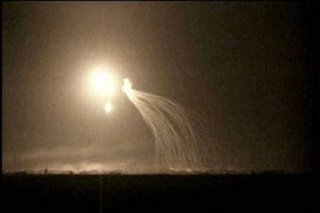

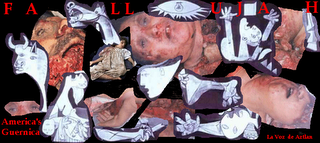



 Bill Simpich writes: "Two district court rulings in the last month focus on whether the National Security Agency will be free to eavesdrop on Americans as a matter of domestic policy ... The odds are good that both of these cases will be heard by the United States Supreme Court before George Bush completes his term of office, if they are not mooted by the passage of the National Security Surveillance Act this autumn ... The outcome of these NSA cases and this autumn's Congressional vote will affect the entire future of this country."
Bill Simpich writes: "Two district court rulings in the last month focus on whether the National Security Agency will be free to eavesdrop on Americans as a matter of domestic policy ... The odds are good that both of these cases will be heard by the United States Supreme Court before George Bush completes his term of office, if they are not mooted by the passage of the National Security Surveillance Act this autumn ... The outcome of these NSA cases and this autumn's Congressional vote will affect the entire future of this country."

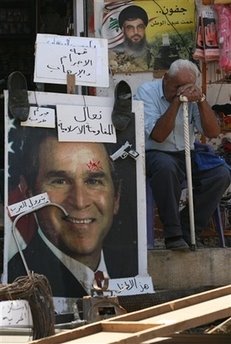 AP - Sat Aug 26, 11:05 AM ET
AP - Sat Aug 26, 11:05 AM ET
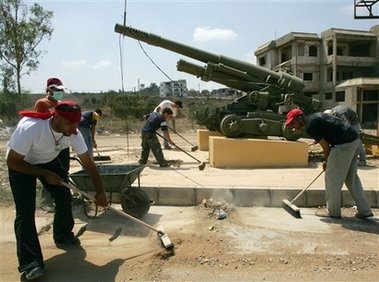 Lebanese PM says army can patrol border
Lebanese PM says army can patrol border Lebanese PM says army can patrol border
Lebanese PM says army can patrol border Iran opens nuclear facility saying no threat to Israel
Iran opens nuclear facility saying no threat to Israel Associated Press Susan Haigh August 26, 2006 at 10:15 AM
Associated Press Susan Haigh August 26, 2006 at 10:15 AM I wouldn't hold my breath, with anything these puppet leaders of Bush and his goons have to say, this man has not even had a charge laid against him in the 4 1/2 years of captivity. If this man was guilty of anything these criminals in Power should have laid those crimes out. Georgies friking DEMOCRACY IN ACTION.
I wouldn't hold my breath, with anything these puppet leaders of Bush and his goons have to say, this man has not even had a charge laid against him in the 4 1/2 years of captivity. If this man was guilty of anything these criminals in Power should have laid those crimes out. Georgies friking DEMOCRACY IN ACTION.
 RAW STORYPublished: Friday August 25, 2006
RAW STORYPublished: Friday August 25, 2006 Reuters August 25, 2006 at 06:01 PM
Reuters August 25, 2006 at 06:01 PM Kremlin rising while White House falls into financial and political abyss.
Kremlin rising while White House falls into financial and political abyss.  Bush, who lies about war and matters of state, takes credit for a rectal outburst to the amusement of his sycophantic aides.
Bush, who lies about war and matters of state, takes credit for a rectal outburst to the amusement of his sycophantic aides.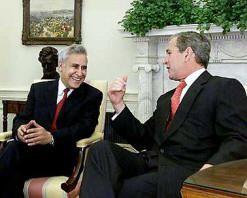 Israeli President Moshe Katsav (l.), under police investigation for raping a female staffer, and George W. Bush (r.), enmeshed in scandals arising from marital difficulties, an affair with Secretary of State Condoleezza Rice, and the adolescent passing of gas while meeting new male White House staffers.
Israeli President Moshe Katsav (l.), under police investigation for raping a female staffer, and George W. Bush (r.), enmeshed in scandals arising from marital difficulties, an affair with Secretary of State Condoleezza Rice, and the adolescent passing of gas while meeting new male White House staffers. Israeli President Moshe Katsav (l.), under police investigation for raping a female staffer, and George W. Bush (r.), enmeshed in scandals arising from marital difficulties, an affair with Secretary of State Condoleezza Rice, and the adolescent passing of gas while meeting new male White House staffers.
Israeli President Moshe Katsav (l.), under police investigation for raping a female staffer, and George W. Bush (r.), enmeshed in scandals arising from marital difficulties, an affair with Secretary of State Condoleezza Rice, and the adolescent passing of gas while meeting new male White House staffers.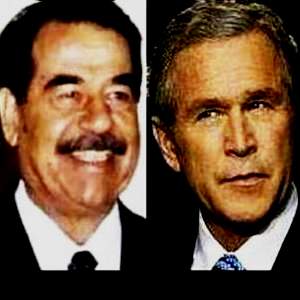
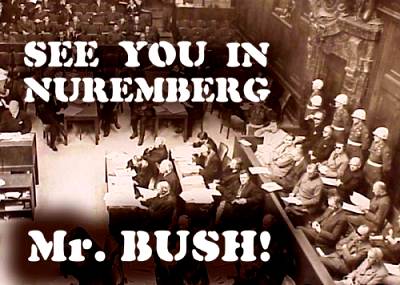
 Glenn Greenwald
Glenn Greenwald Jeff Handmaker, Electronic Lebanon
Jeff Handmaker, Electronic Lebanon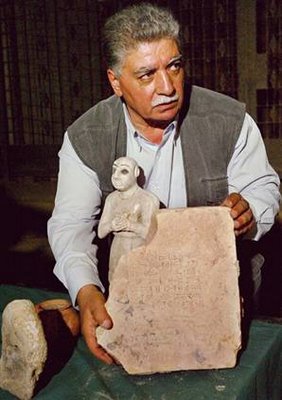 Michael Howard, The Guardian
Michael Howard, The Guardian
 Washington Post Michael D. Shear August 25, 2006 at 06:01 PM
Washington Post Michael D. Shear August 25, 2006 at 06:01 PM Bush “Putting Aside The Troubles Of The World” For Another
Bush “Putting Aside The Troubles Of The World” For Another 

 Los Angeles Times Robert Salladay August 25, 2006 at 04:07 PM
Los Angeles Times Robert Salladay August 25, 2006 at 04:07 PM Think Progress August 25, 2006 at 04:34 PM
Think Progress August 25, 2006 at 04:34 PM Eat The Press August 25, 2006 at 10:02 PM
Eat The Press August 25, 2006 at 10:02 PM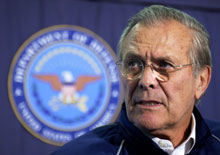 Wall Street Journal August 25, 2006 at 10:18 PM
Wall Street Journal August 25, 2006 at 10:18 PM New Haven Independent Melinda Tuhus August 25, 2006 at 07:36 PM
New Haven Independent Melinda Tuhus August 25, 2006 at 07:36 PM The Times Of London David Banks August 25, 2006 at 08:32 PM
The Times Of London David Banks August 25, 2006 at 08:32 PM Associated Press Jennifer Talhelm August 25, 2006 at 09:19 PM
Associated Press Jennifer Talhelm August 25, 2006 at 09:19 PM The Guardian Jonathan Watts August 25, 2006 at 09:19 PM
The Guardian Jonathan Watts August 25, 2006 at 09:19 PM
 Associated Press Michelle Roberts August 25, 2006 at 10:00 PM
Associated Press Michelle Roberts August 25, 2006 at 10:00 PM Newt Gingrich: "It Was Katrina That Broke The Sense That The Republicans Could Govern Well''...
Newt Gingrich: "It Was Katrina That Broke The Sense That The Republicans Could Govern Well''...